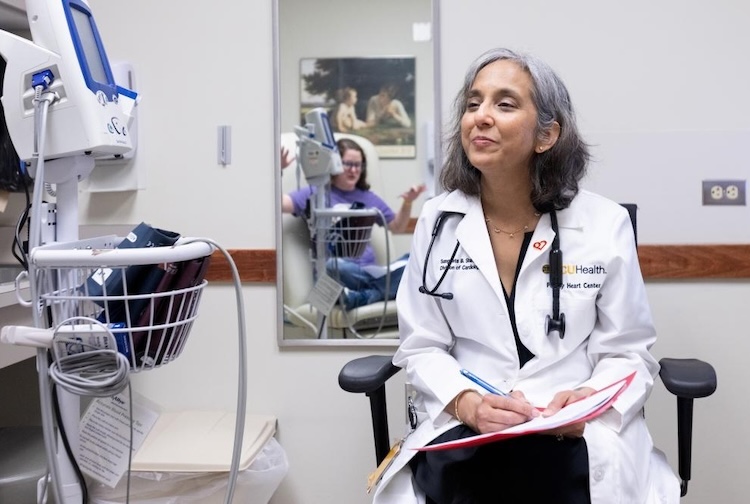Heart health and pregnancy
VCU Health Community Memorial Hospital cardiologist breaks down factors that increase women's risk for cardiovascular disease.
June 01, 2023 Care teams at VCU Health Community Memorial Hospital are keeping an eye out for both the baby and mother, as new emerging health concerns could affect them before and after childbirth. (Getty Images)
Care teams at VCU Health Community Memorial Hospital are keeping an eye out for both the baby and mother, as new emerging health concerns could affect them before and after childbirth. (Getty Images)
By Kristy Fowler
Bringing a new life into the world can be filled with joy and many changes, both physically and emotionally, for parents. Care teams at
VCU Health Community Memorial Hospital are keeping an eye out for both the baby and mother, as new emerging health concerns could affect them before and after childbirth.
According to the American Heart Association, heart disease is considered the leading cause of death for pregnant women and new mothers. Studies show upwards of 33% of maternal deaths in the United States are caused by cardiovascular disease.
“During pregnancy, women gain weight, produce hormones and develop insulin resistance. These changes can cause gestational diabetes and high blood pressure, which cause damage to the vascular system. Some women may not know they have risks for cardiovascular issues until they become pregnant,” CMH cardiologist Bethany Denlinger, M.D., said.
There are many widely known risk factors for heart disease that could be managed through lifestyle choices, such as diabetes, smoking, obesity, high blood pressure and high cholesterol, among others. Denlinger notes that there are some non-traditional health issues that could increase risk factors for women and pregnant people, which she recently shared with CMH team members.
What are some non-traditional risk factors for cardiovascular disease?
Some emerging heart disease risks include autoimmune diseases, such as rheumatoid arthritis and lupus, depression and adverse pregnancy outcomes.
Cancer treatment is a risk for future heart disease. The focus of radiation is smaller and more precise in recent years versus 20 years ago, but it is still a risk. Radiation not only increases the risk of coronary artery disease, but it affects the heart's valves and wall. Several types of chemotherapy for breast cancer can cause heart failure as well.
Depression is also a risk for heart disease, probably because it's associated with smoking, physical inactivity and social isolation.
What are some adverse pregnancy outcomes?
Adverse pregnancy outcomes are considered health problems that happen to the mother, newborn or both during pregnancy, childbirth and in the postpartum period. About 30% of pregnant women experience adverse pregnancy outcomes.
Some of these health problems include high blood pressure pregnancy disorders, which 14% of pregnant people experience, about 5% are diagnosed with gestational diabetes and 6% to 12% have preterm delivery.
In 2021, the maternal mortality in the U.S. was more than three times the rate in most other similar income countries. This may be due to the increasing number of pregnant women in the U.S. that have chronic health conditions and preexisting high blood pressure, diabetes or heart problems. Another factor is that women are having babies later in life.
Do the physical effects of pregnancy reveal underlying heart problems or do adverse pregnancy outcomes cause heart damage?
Some physicians refer to the fourth trimester as the time between when a woman has an adverse pregnancy outcome to a later future cardiovascular risk. Mothers are focused on pediatric appointments for their children and forget they need annual physicals too. It is important for women to discuss a thorough obstetric history with their doctor, undergo screenings for cardiovascular risk factors, and engage in aggressive lifestyle modification if needed.
What can women do to stay healthy throughout their lifetimes?
The American Heart Association has a program called “Life's Simple 7” which contains the seven most important predictors of heart health and steps we can take to keep our hearts healthy. These include healthy eating, managing blood pressure, managing cholesterol, reducing blood sugar levels, staying active, losing weight and stopping smoking.
Scheduling annual check-ups with a primary care provider is also important to keep track of your overall health and wellbeing. Many elements of the “Simple 7” are routinely evaluated during these annual appointments.
Sign Up for VCU Health Community Memorial Hospital's E-Newsletter




